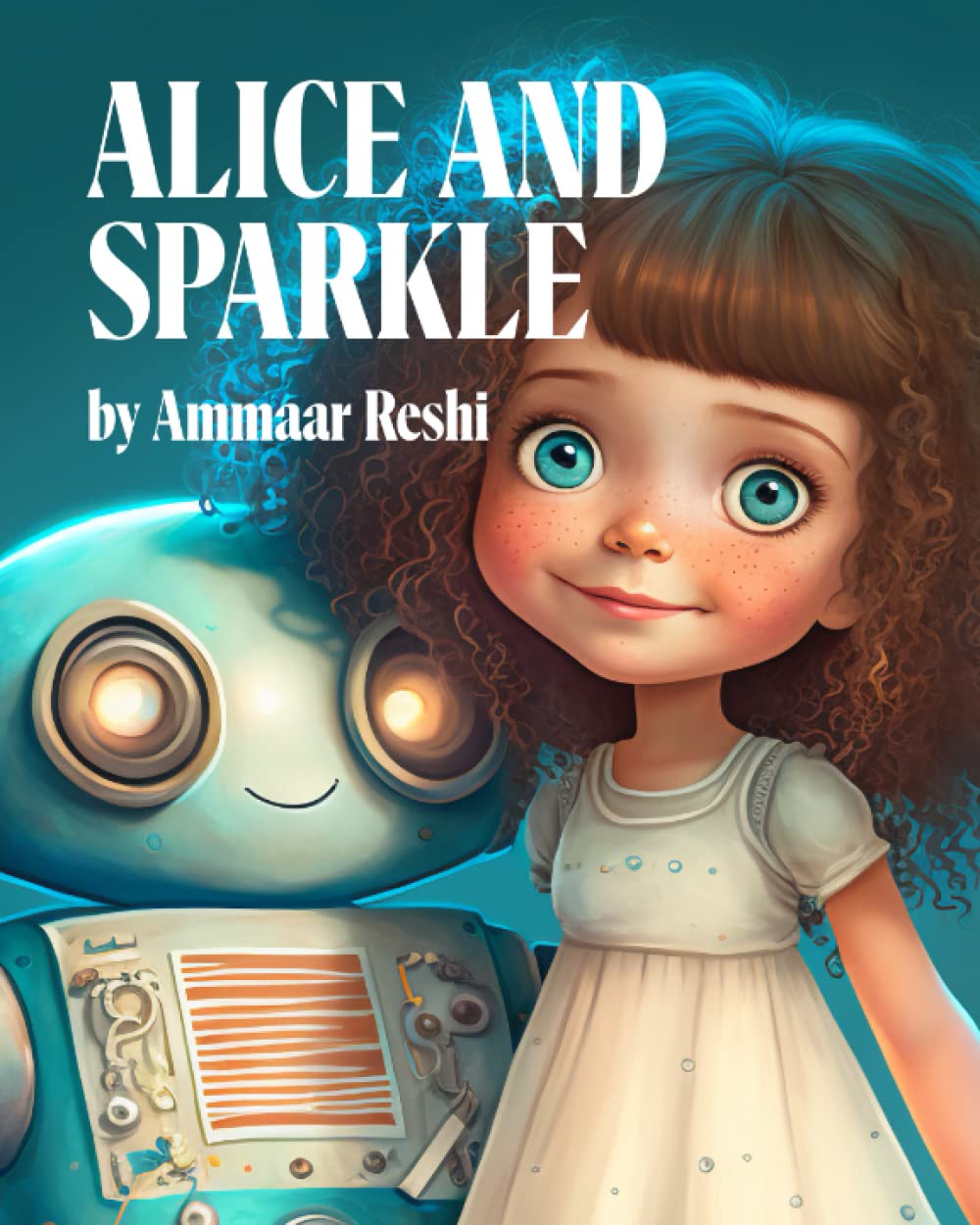Is it possible to write a book in one weekend? Sure, it is. Just ask children’s author Ammaar Reshi (although he probably wishes you wouldn’t).
Reshi, a design manager at Brex, used popular artificial intelligence (AI) tools ChatGPT and Midjourney to create and publish a story called “Alice and Sparkle,” over a weekend in 2023. Reshi claimed the book was the first of its kind because it was co-created with AI. He gives his writing and illustration partner full credit in the book synopsis.
But wait…it gets weirder.
The book is about a young girl named Alice who creates her own AI named Sparkle. In the book, they go on fun adventures, combining their knowledge to change the world for the better (or so the synopsis promises). Customer reviews give it a 3.1 out of 5 stars on Amazon.
Some reviewers took pot-shots at the fact Reshi relied too heavily on AI to write the book. However, a few others said they were less bothered by the AI involvement and more concerned with the complete lack of storytelling throughout the book.
“I’ve seen some amazing stuff that was made using A.I. tools such as Midjourney and ChatGPT,” said a reviewer with the handle Hamsteroid. “This is not that.” Hamsteroid goes on to say the book lacks an arc in the storytelling and just abruptly ends.
Fellow reviewer Langue Master said, “This is what happens when AI is used to write a story with no human writer behind to guide things. This story is quite empty in terms of its story arc and content and the illustrations are poorly made/generated.”
Ouch.
Besides the possibility of garnering blistering reviews for AI-generated content, there are other reasons why you probably shouldn’t rely on it to write that dystopian novel you’ve had brewing in your brain for the last decade.
Before you make nice with ChatGPT or another AI tool, take some time to discover:
- What the heck is an AI content generator?
- How is AI disrupting the publishing industry?
- What are some of the common problems with AI content?
- Who holds the copyright for AI-generated content and illustrations?
What the heck is an AI content generator?
Technophobes (and those living under rocks) may have zero clue what AI content generators are all about. For the uninitiated, AI content generators are technology programmed to use Natural Language Generation (NLG) to turn thoughts into words on a page.
Since AI can’t think like humans, engineers train them to learn how to engage in human-like conversations. They rely on vast amounts of information gleaned from the internet – articles, blogs, news stories, Reddit threads – to respond to prompts.
One of the most talked about technologies in this space is ChatGPT. It’s dominated the news cycle since the beginning of the year.
However, AI content generators existed long before ChatGPT hit the scene. Some of the most popular technologies for creating written content include Jasper AI and AI Writer. DALL-E and Midjourney currently covet the top spots for AI image creation.

How is AI disrupting the publishing industry?
While most organizations are figuring out how to use AI to replace their marketing teams full of humans, there is another group of people coveting its so-called power to generate words quickly. Wannabe authors have turned to generative AI to make their dreams come true. As we discussed earlier in this blog post, using AI to write a novel can backfire.
Some publishers have publicly admonished writers who used AI to generate bland content. Science fiction publisher Clarkeworld Magazine took to its Twitter account in mid-February to proclaim it was closing submissions because of the sheer volume of AI-generate content it had received.
Of the 1,200 submissions it received in February, Clarkesworld founder Neil Clarke claimed more than 500 were AI-produced.
Another publication, Science, has outright banned content generated by AI in any of its journals. Its policy states, “text generated from AI, machine learning, or similar algorithm tools” is considered scientific misconduct.
On the image side of things, Getty Images has banned the upload and sale of AI-generated illustrations because of fears over future copyright claims. We’ll talk more later about whether you can copyright AI-produced content.
What are some of the common problems with AI content?
AI language models like ChatGPT can assist with content generation. However, they’re not a substitute for human creativity, critical thinking, or subject matter expertise.
Beyond lacking the emotions of a human writer, relying on AI to write an entire novel (or any other content, for that matter) comes with risks.
- Ethical concerns. Al algorithms require constant monitoring and training. Otherwise, they can exhibit bias. AI technology also has the potential to replace human labor, which isn’t always a good thing.
- Impersonal tone. AI lacks emotions and insights that can only be gained through personal experience. Because it’s not capable of feeling, AI tends to write tone-deaf content that risks alienating your readers (as evidenced by some of the reviews of Reshi’s book).
- Inaccuracy. AI language models make mistakes, especially if you’re using them to produce content on complex topics. AI can find data, but it can’t interpret it. It can end up drawing the wrong conclusions, which can get you into hot water if you put something in print that’s not verifiable by solid data or facts.
- Lacks originality. AI tools use existing data and trends to create content when given a prompt. Anything you ask it to create is going to mimic other works with the same topic.
- Limited understanding of the audience. The English language is complex and nuanced. If we’re being totally honest, we must acknowledge that many native English speakers struggle with using it correctly. Yet, we expect AI to grasp the cultural references, emotions, and tone needed for producing content that moves an audience. It can’t, which leads to some awkward copy at times.
No matter how much you would like it to be true, AI simply can’t replace human emotions and expertise. At least not yet anyway.

Who holds the copyright for AI-generated content and illustration?
The short answer to who holds the copyright for AI-generated content and illustrations is not you. Herein lies a huge problem with organizations relying on AI tools like ChatGPT and Midjourney for creating all their written and visual content.
Images and text 100 percent generated by AI don’t qualify for copyright protections, according to the U.S. Copyright Office.
In February 2022, the copyright office ruled in the case of the comic book “Zarya of the Dawn,” whose author used illustrations produced solely by Midjourney. Since non-humans created the images, author Kristina Kashtanova gained copyright protections for the story, but the images were excluded.
The same holds true for text written by AI that humans have not altered in some way. When AI makes all the decisions about how something is written or designed, it bypasses the human creative process required for copyrighting.
Choosing humans over machines
It’s tempting to turn to machines over humans to produce content, especially when looking to cut expenses. Aspiring authors can fall into this trap along with organizations.
Choosing humans over machines is a better option. Not only does it get you higher-quality content, but it also ensures you own the rights to that content once it’s completed. We hope you make the right decision.


My site covers a lot of topics about Web Design and I thought we could greatly benefit from each other. Awesome posts by the way!
Awesome page with genuinely good material for readers wanting to gain some useful insights on that topic! Keep up the great work!
Heya excellent website! Does running a blog similar to this require a massive amount work?
I’ve virtually no knowledge of programmming however I
had been hoping to start myy own blog soon. Anyhow,
should you have any suggestions or tips for new blog ownners
please share. I understand this is off subject nevertheless
I just needed to ask. Many thanks!